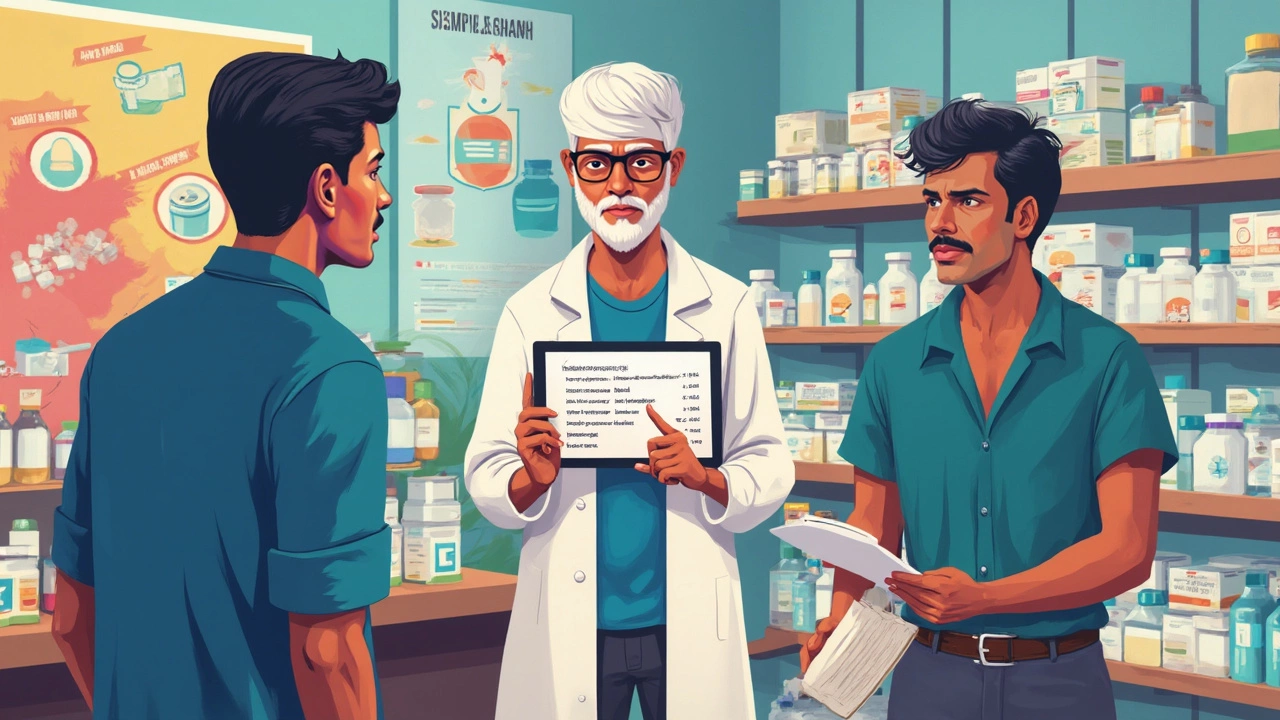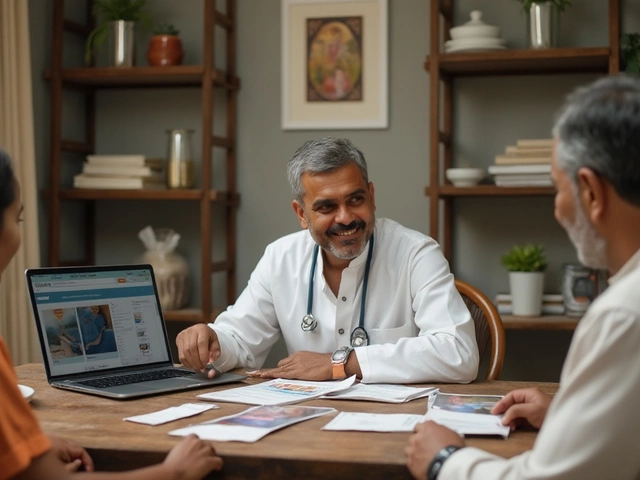
What Drugs Should Be Avoided in Diabetes? Know Before You Pop a Pill
Ever grabbed a painkiller or cold medicine without thinking twice? If you have diabetes, those tiny pills can have a bigger impact than you expect. It’s not just about sugar in food—certain medications can make your blood sugar jump or crash, sometimes even before you see any warning signs.
Some of the most popular drugs out there, like steroids or certain heart meds, can throw your diabetes management way off track. Even picking up a simple allergy tablet without knowing what’s inside could set off problems with your sugar levels. That’s why you need to know what to skip, what to double-check, and what to ask your pharmacist or doctor before changing up your meds.
- How Certain Medications Affect Blood Sugar
- Steroids, Beta Blockers, and Other High-Risk Drugs
- Common Over-the-Counter Meds to Watch Out For
- Interaction Nightmares: Diabetes Drugs With Other Meds
- Smart Tips for Safer Medication Use
How Certain Medications Affect Blood Sugar
It’s easy to forget, but not every pill you swallow plays nice with your blood sugar. Some meds hike it up, others drop it fast—and those swings aren’t always predictable. People with diabetes need to be careful because even a common prescription can sideline your control and ruin your day.
Here’s how some meds stir the pot:
- Steroids— prescribed for everything from joint pain to allergies—are infamous for raising blood sugar. Even a short course can push glucose numbers way above normal. Not cool if you’re already on insulin or other diabetes meds.
- Beta blockers, used for high blood pressure and heart problems, can mask the symptoms of low blood sugar. That means you could start sweating or feel weak and not realize your glucose is tanking until it’s a crisis.
- Diuretics (“water pills”) might increase blood sugar levels over time, especially if you’re already at risk for complications.
- Some antidepressants and antipsychotics have been linked to higher blood sugar, especially with long-term use.
- Statins (those cholesterol-busters) slightly increase blood sugar in certain people, especially if you’re at risk for type 2 diabetes.
For a quick look, here’s a table showing well-known classes of drugs and their usual impact on blood sugar:
| Drug Type | Raises Blood Sugar? | Lowers Blood Sugar? | Notes |
|---|---|---|---|
| Steroids (e.g. prednisone) | Yes (often a lot) | No | Watch out with any dose |
| Beta Blockers | Rarely | Can hide lows | Masks low sugar signs |
| Diuretics | Yes | No | Hikes glucose or potassium issues |
| Statins | Sometimes | No | Small increase in risk |
| Antipsychotics | Yes | No | Significant risk long-term |
Here’s the bottom line: Some medications, even those you don’t think twice about, can quietly mess with your blood sugar numbers. Before starting anything new, especially if it isn’t for diabetes itself, ask your doctor about side effects on blood sugar and always keep an extra eye on your levels.
Steroids, Beta Blockers, and Other High-Risk Drugs
Some medications hit people with diabetes harder than others, and steroids are at the top of that list. Drugs like prednisone and cortisone, often given for inflammation, asthma, or joint pain, can send your blood sugar skyrocketing in just a few days. Even inhalers or steroid creams can have this effect if you use them regularly. If you notice more thirst or peeing a lot more after starting steroids, that’s often your first clue your blood sugar is out of whack.
Beta blockers are another tricky group. They’re mostly used for high blood pressure or heart problems. Think of meds like metoprolol, atenolol, or propranolol. The issue? Beta blockers can hide the usual warning signs of low blood sugar, like shakiness or palpitations. You might not get those sweats or jitters while your sugar drops, which can be dangerous if you’re taking insulin or other diabetes medicine that can cause lows.
There are a few more high-risk meds to watch:
- Diuretics ("water pills" like hydrochlorothiazide or furosemide) — can make blood sugar and cholesterol go up, especially with long-term use.
- Statins (for cholesterol) — these can rarely bump up blood sugar, so your doctor may monitor sugar levels more closely.
- Some anti-psychotics like olanzapine or quetiapine — these have a reputation for raising blood sugar a lot, especially with long term use.
Check out how common these meds can affect blood sugar in real life:
| Drug | Main Use | Possible Effect on Blood Sugar |
|---|---|---|
| Prednisone (Steroid) | Asthma, arthritis, allergies | Major increase (can double levels in some cases) |
| Metoprolol (Beta Blocker) | Blood pressure, heart disease | Masks low blood sugar symptoms |
| Hydrochlorothiazide (Diuretic) | Blood pressure | Mild to moderate increase |
| Olanzapine (Antipsychotic) | Mood disorders | Rapid increase in many cases |
So if you’re prescribed any of these, always mention your diabetes to your doctor or pharmacist. Ask if there are safer options, or if your doses need to change while you’re taking them. Checking your blood sugar more often can catch problems before they spiral.

Common Over-the-Counter Meds to Watch Out For
Going through the pharmacy aisle with diabetes? You’ll want to scan those labels before tossing anything in your basket. Even drugs you’ve taken for years, like painkillers or allergy meds, can mess with your blood sugar. Sometimes it’s about the active ingredient, and sometimes it’s all the extra sugar and syrups packed inside.
Check out the usual suspects:
- Decongestants (like pseudoephedrine and phenylephrine): These are hiding in a lot of cold and flu tablets. They can raise blood sugar by making your body pump out more stress hormones. Plus, they might jack up blood pressure too, not great if you already have diabetes.
- Cough syrups and lozenges: Many are loaded with sugar. Even the “honey lemon” flavors are risky—always look for the sugar-free versions and don’t assume herbal means safe.
- NSAIDs (like ibuprofen or naproxen): Used for pain and fever, they can make your kidneys work harder. If kidney problems are already on your radar, chat with your doctor first.
- Antihistamines (like diphenhydramine or loratadine): The older ones can make you sleepy, which can mask low blood sugar symptoms and cause confusion. Not all are dangerous, but always double-check for hidden sugars in syrups.
- Aspirin: Low doses are usually safe, but high doses might lower blood sugar unpredictably. Stick with your doc’s advice if you take it daily.
Here’s a quick look at how some common over-the-counter meds stack up for people with diabetes:
| Drug Type | Risks for Diabetes | Safer Alternatives |
|---|---|---|
| Decongestants | Increased blood sugar, higher blood pressure | Saline nasal spray, steam inhalation |
| Cough Syrups | Hidden sugars spike blood sugar | Sugar-free cough syrups, throat sprays |
| NSAIDs | Kidney strain, fluid retention | Acetaminophen (paracetamol) for short-term use |
| Antihistamines | Masks low blood sugar signs, drowsiness | Non-drowsy (second-gen) tablets |
When you’re not sure, ask your pharmacist for sugar-free options and always mention you have diabetes. And don’t ignore the ingredient list—look out for glucose, sucrose, fructose, and corn syrup. A little detective work now can save a ton of hassle (and blood sugar swings) later.
Interaction Nightmares: Diabetes Drugs With Other Meds
If you’re taking diabetes medication, it’s easy to think your prescription is working smoothly—until another drug joins the party. Mixing diabetes meds with the wrong pill or over-the-counter product can mess with your blood sugar in ways that catch a lot of people off guard.
Here’s a clear example: certain antibiotics, like fluoroquinolones (think ciprofloxacin or levofloxacin), have been known to push sugar levels up or down fast. If you’re already using insulin or sulfonylureas (glipizide, glyburide), this can mean a scary plunge into low blood sugar or a sudden spike.
Other surprises? Blood pressure meds called beta blockers (metoprolol, propranolol) not only make it harder to spot low blood sugar symptoms like a racing heart, but they might also actually make those lows worse. ACE inhibitors, sometimes used for kidney protection in diabetes, might unexpectedly drop sugar, too.
Some antidepressants, especially the older tricyclic ones, can also make it tricky. They might raise your sugar, especially if your weight or appetite changes while on them. Then there’s birth control pills or hormone therapy—they often push sugar higher, so your doctor might need to tweak your diabetes plan.
Some common combos to watch out for:
- Insulin plus corticosteroids (like prednisone): usually causes blood sugar spikes
- Metformin and contrast dye (used in scans): may stress your kidneys
- Oral diabetes meds with alcohol: increases risk of dangerous lows (hypoglycemia)
- Diabetes drugs with certain cholesterol meds (statins or niacin): blood sugar can rise
Here’s what really matters: whenever your doctor prescribes something new—even for a cold or a skin infection—make sure they know about every pill you’re taking. Don’t skip your pharmacist, either. Most mixing mistakes come from nobody checking the full list.

Smart Tips for Safer Medication Use
If you’re managing diabetes, there’s more to watch than just blood sugar and diet. Taking the wrong meds or missing out on key safety steps can really make things worse. Here’s what you actually need to do to stay out of trouble with your medications.
- Always check labels. Hidden ingredients can trip you up. Watch out for sugar, dextrose, or high-carb fillers in cough syrups, antacids, or chewable tablets.
- Keep a full list of every med and supplement you take. Update it whenever something changes and carry it—either in your wallet or on your phone. This becomes a lifesaver if you end up in urgent care.
- Bring up diabetes with your pharmacist or doctor every single time you’re prescribed something new. Some meds interact and screw up your glucose, but your healthcare provider doesn’t automatically know every pill you take.
- Ask if non-drug options could help. Maybe that mild pain or allergy can be tackled with lifestyle tricks first, so you skip the risk altogether.
- Don’t mess with your doses or stop a drug suddenly just because you read something scary. Always check in with a doctor before making any medication changes.
- Pay attention to new or weirder symptoms, like dizziness, unexplained tiredness, or headaches—these can hint at blood sugar swings caused by a new medication.
If you use multiple meds, especially for conditions like blood pressure or cholesterol, you’re at a higher risk for drug interactions. A pharmacist can do a quick “medication review” and catch stuff you might miss on your own.
| Medication Type | Possible Effect | Example Drugs |
|---|---|---|
| Steroids | Raise blood sugar | Prednisone, Hydrocortisone |
| Beta Blockers | Mask low blood sugar symptoms | Atenolol, Metoprolol |
| Some Antibiotics | Cause low or high blood sugar | Levofloxacin, Ciprofloxacin |
| Cold or Allergy Remedies | May contain sugar or raise blood pressure | Decongestants, Cough syrups |
Smart medication use isn’t just about avoiding mistakes—it’s about staying in control. If in doubt, talk about any new or over-the-counter medicine with your healthcare team. That one quick question could save you a ton of trouble down the line.

Arnav Singh
I am a health expert with a focus on medicine-related topics in India. My work involves researching and writing articles that aim to inform and educate readers about health and wellness practices. I enjoy exploring the intersections of traditional and modern medicine and how they impact healthcare in the Indian context. Writing for various health magazines and platforms allows me to share my insights with a wider audience.
About
Medical Resource Center India is a comprehensive online platform dedicated to providing reliable health information and medical resources in India. Explore a wide range of articles, tips, and advice on medicine, healthcare services, and wellness. Stay informed about the latest developments in Indian medicine and access valuable insights into maintaining a healthy lifestyle. Discover expert guidance and health solutions tailored for every Indian citizen. Your go-to destination for authoritative medical knowledge in India.



